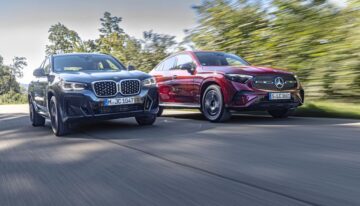The portal www.mbpassion.de informs that deliveries for the new Mercedes EQS SUV model will be delayed until the second quarter of 2023.
The new Mercedes EQS SUV model has long delivery delays. Those who order the new luxury electric SUV now will not receive it until the second quarter of 2023.
Mercedes announced prices for the new Mercedes EQS SUV on 9 August 2022 and three versions are available at sales start:
EQS 450+, from 110,658.10 euros
EQS 450 4Matic, from 114,446.10 euro
EQS 580 4Matic, from 135,291.10 euro
All three versions have more power than the similar version ot the EQS sedan: 360 HP instead of 333 HP for the EQS 450+/450 4Matic and 544 HP instead of 523 HP for the EQS 580 4Matic.
Thus, the delivery time for the new EQS SUV (codename X296) is longer than that for the EQS saloon, reports mbpassion.de. Those who order a Mercedes EQS limousine now will receive it in the fourth quarter of 2022 at the earliest, while the Mercedes EQE sedan is not available until the first quarter of 2023.
The delay in deliveries for the Mercedes EQS SUV is partly explained by the fact that it is being produced at the Mercedes plant in Tuscaloosa, Alabama, USA and an additional 2 months must be taken into account for shipping by sea from the USA to Europe.
For the time being, the Mercedes EQS SUV is not available in the US, where Mercedes is currently only selling the Mercedes EQS and soon the Mercedes EQB compact SUV.
All manufacturers are having problems with deliveries of electric models due to rising lithium prices and lack of raw materials for batteries.
Mercedes is working to secure its sources of battery raw materials. To this end, Mercedes signed an agreement with the Canadian government on 25 August to secure access to supplies of lithium, cobalt and other battery raw materials. As part of this agreement, Mercedes will sign a deal with Canadian company Rock Tech Lithium to supply 10,000 tonnes of lithium hydroxide.
Also, under a separate memorandum, Mercedes will explore opportunities for mining, refining and manufacturing in the country. Canada has recently finalised its Critical Minerals Strategy to increase the supply and processing of lithium, cobalt, nickel, copper and rare-earth elements.













